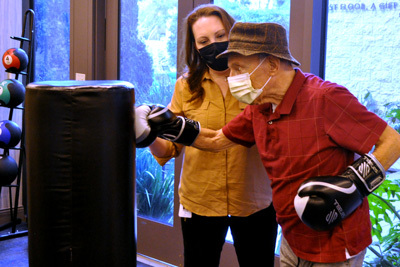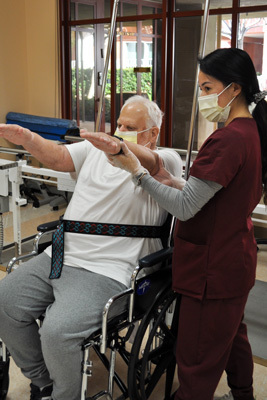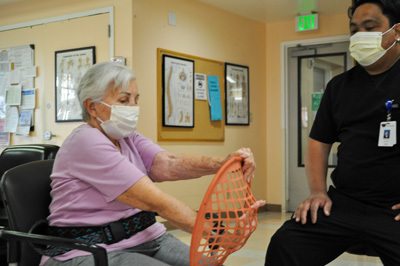At Los Angeles Jewish Health, Short-Term Rehab Delivers Long-Term Results


At Los Angeles Jewish Health, Short-Term Rehab Delivers Long-Term Results

In the world of short-term rehabilitation for seniors, not all programs or facilities are created equal. Given its breadth of services, depth of experience, and track record of results, Los Angeles Jewish Health's high-impact short-term rehab is in a class by itself.
Under the supervision of Director of Rehabilitation Services Daniel Persichetti, the offerings are robust. "We have seven distinct short-term rehab operations at Los Angeles Jewish Health, each one geared to meet diverse seniors' needs," he says. "It's terrific because it means we're able to help with a wide range of challenges, getting people back on their feet and ready to reclaim mobility and function that may have been compromised due to a recent hospital stay or illness."
The programs include short-term, skilled nursing facility-based rehab at Los Angeles Jewish Health's Grancell Village campus; a PACE (Program of All-inclusive Care for the Elderly) clinic at the Brandman Centers for Senior Care, also located in Grancell Village; and outpatient services on the Eisenberg Village campus and at Fountainview at Gonda Westside, in Playa Vista.

"When older adults are released from the hospital, they may not be quite ready to return home, so they come stay with us for a bit, instead," Daniel says. "Maybe they can't walk very far or have difficulty climbing out of bed. Perhaps they've just had a hip or knee replacement, or they've suffered a stroke. We equip them with the right tools to build up their strength and recover their independence."
The outpatient clinic at Eisenberg Village is also open to members of the general public, who can come to campus to leverage Los Angeles Jewish Health's renowned expertise in senior care. "Our speech therapists and physical therapists are available for things like memory and cognition training, improving balance and gait, and refining overall strength and function," Daniel says. "As those in need of these services discover just how good our care is, more and more people from the greater community are relying on us every day."
In addition to having access to an outpatient clinic, seniors participating in PACE at the Brandman Centers may benefit from home visits, as well. "Sometimes, our therapy staff will go to a participant's home to make sure they have the tools they need to help in their recovery. For instance, they may evaluate if a grab bar is in the right spot for the shower, or ensure the person has the appropriate ramp to make their house accessible—essentially, making equipment recommendations to help seniors live in their homes for a longer period of time," Daniel says.

He and his team of about 30 full-time therapists (plus 20 or so per diem staff) also treat longer-term Los Angeles Jewish Health residents. "Sometimes, folks in assisted living may experience a decline—say after a fall. Our caring team provides them with therapy two or three days a week to help them improve," he says. "One of the things that makes our therapy so successful is that, because it's in-house, we develop good collaborative relationships with nurses and other Los Angeles Jewish Health staff, so we can work together as a team to get residents better in a timely manner."
As Daniel sees it, these partnerships are a key distinguishing feature of rehab services at Los Angeles Jewish Health. "I've worked for many companies over the past 17 years, starting out in acute care and then moving on to aquatic therapy, outpatient care, and acute rehab. But working for Los Angeles Jewish Health is like night and day. Not only is there a real family atmosphere here, but also, the primary focus is different: It is about serving people and the community, rather than solely on generating financial gain."
For Daniel, one of the most gratifying parts of the job is watching people start to feel empowered when they realize they can do things on their own. "We see so many success stories," he says, "and I'm proud of the gains our seniors make with our support."
Among Los Angeles Jewish Health's satisfied short-term rehab customers is David Goldstein, who sought intensive physical therapy after fracturing his humerus (upper arm bone). "Los Angeles Jewish Health staff are responsive, they know what they're doing, and they make you feel like you're in your own home," he says. "Although being here is only temporary, they've done everything possible to make me comfortable and happy. I chose the right place, and I would highly recommend it."